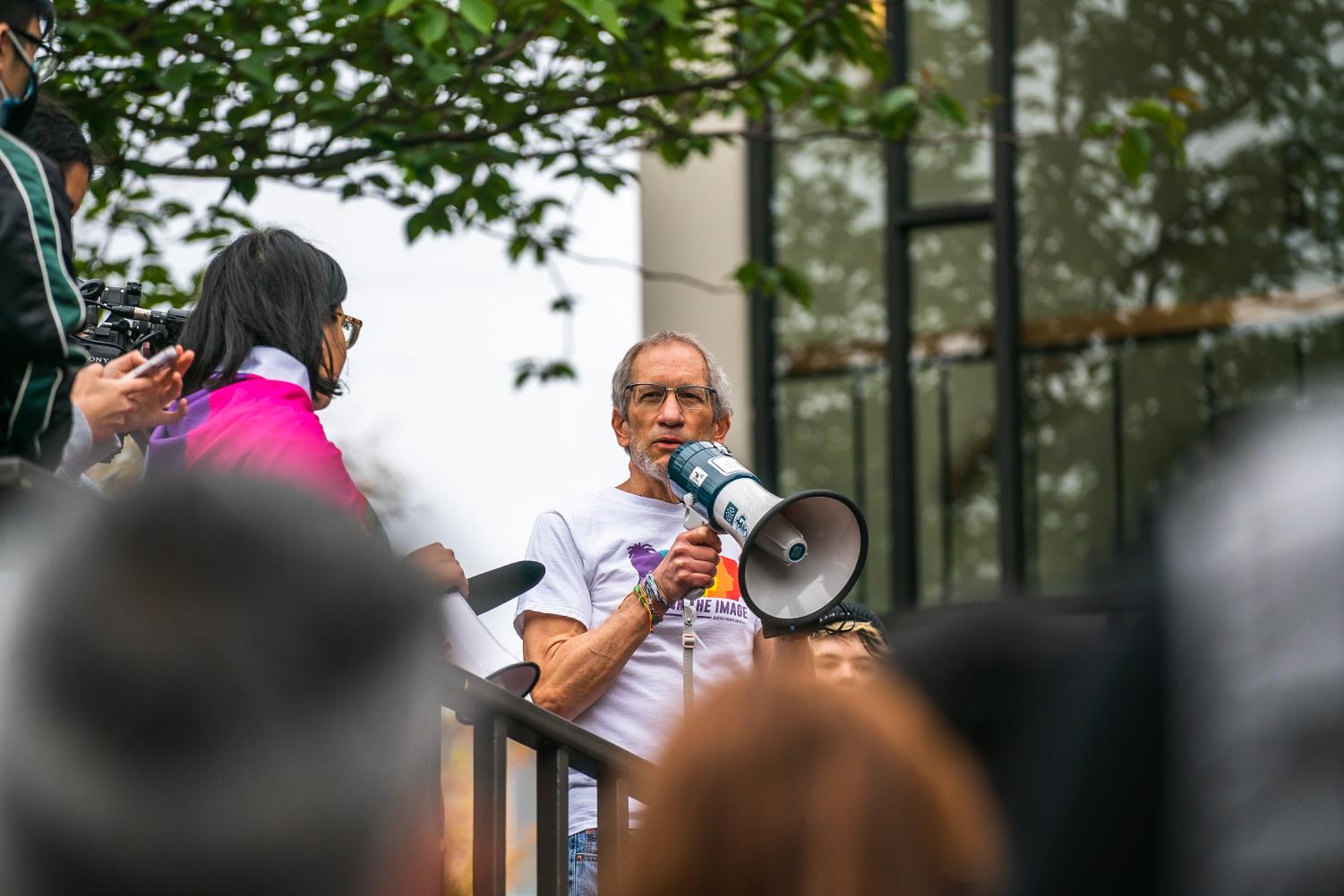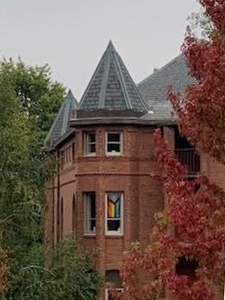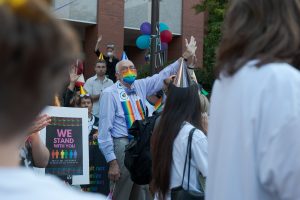Signs of welcome should not be considered divisive or polarizing
Response to “Welcome to the culture wars”
February 2, 2023

On Jan. 30, students in my classes discussed the SPU Falcon article – “Welcome to the Culture Wars” written by Audrey Oscarson. The article documents the rapid removal of flags and messages on the morning of Jan. 27 that had been placed by students protesting current SPU policies affecting LGBTQIA+ members of our community. According to the article the “display was planned as a response to an email from SPU admin on Jan. 13, asking faculty to ‘take down any messages or signage that are diverse, polarizing, or show dissension.’”
This protest and the SPU administration’s determination to immediately remove all evidence that a protest had taken place raised many, many issues about the role and limits of freedom of speech on our campus. What students in my class seemed most interested in discussing, though, was the phrasing in the email sent to faculty: “messages … that are divisive, polarizing, or show dissension.” They focused on those three words – divisive, polarizing, dissension – and they raised two critical questions about them.
The first question was who gets to determine which messages are divisive, polarizing or express dissent? It was quite clear to my students that they do not have any say in defining those terms. As a faculty member, I can say that faculty have had no role in defining those terms.
That leaves only our board and senior administrators. Messages, then, that the board/senior administrators find disturbing to themselves run the risk of being denied expression on our campus, as occurred on the 27th.
The second question was why could the pride flags be polarizing and divisive? My students accepted that they could be understood appropriately as an expression of “dissent” with official policies, but why would they be considered divisive?

The pride flags have not divided our community, they argued, it was the board’s decision that splintered our community. Something can only be “divisive” if the starting state is unity. Clearly on the morning of Jan. 27, the flags did not destroy a pre-existing consensus.
At a deeper level, though, what could possibly be divisive about an expression of welcome? Pride flags symbolize that queer folk are recognized, appreciated and welcome. No one is being turned away. If we have an SPU banner that welcomes BIPOC folk, is that divisive? It seems that such a banner would only be “polarizing” if someone felt uncomfortable with the inclusion of BIPOC individuals in our community. It is not the banner’s message that is divisive and polarizing, it is a racist response to the message that is divisive and polarizing.
Is that also not true of pride flags? Welcoming queer folks into our community is not a rejection of cisgender heterosexuals. At least I can say as a member of that category of people that I do not feel rejected or unwelcome when I see those flags. In fact, when I see them, I feel more welcome because I believe that this is the kind of beautifully diverse community I want to belong to.
It seems that the only people who interpret pride flags as divisive and polarizing are those who, in fact, have divided and polarized our community by refusing to accept that God loves LGBTQIA+ folk as much as cisgender heterosexual folk.
This message is neither divisive nor polarizing. It is simply the Gospel. Unfortunately, the message of the Gospel now appears to be interpreted as dissent at SPU.



























































































David • Feb 19, 2023 at 2:23 pm
As a 1990 graduate of SPU, I’d like to share a small part of my own process of understanding, for what it’s worth. This is not a topic I often discuss, so please forgive any stiltedness. My own perspective is as a straight man who never felt any other way, so my actions related to minority sexuality and gender issues are based on how I choose to judge things that I can’t understand. I consider a fundamental question: Is someone’s behavior consistent with love and respect for others? I can accept things I don’t relate to, based on the answer to this question.
From what I’ve read and observed, I believe that minority sexuality is natural. Of course, some urges most people still see as unhealthy or wrong. Pedophilia for example. I’ll simply say that I believe this victimizes children and must be prevented, and I’ll move on to the things I’ve directly observed.
While I was at SPU, my uncle came out as homosexual, and he was married with children. He and his wife graduated from SPU. At first, he just told me that he hadn’t really been into women in college, but I was unsure of what he meant. Of course, I was aware homosexuality existed but had never spoken with someone that I knew was, so I thought maybe he had just been shy and I didn’t know how to politely inquire further. The rest he told me later. The process was hard for him and his family. My aunt told me some about her experience through it, and how devastated and confused she felt. She didn’t remarry. He’s now been with the same man for decades, who was also divorced with children. I later saw a TV show about others in the same circumstances. I can’t imagine someone choosing to go through this process, so I take this as clear evidence that it’s a natural inclination for some to feel attracted to the same sex. This was not an obvious view for someone like me who grew up in the church and schools where same sex attraction was veiled (in retrospect) or expressed as a joke. I learned that sexual minorities could live in love, which is easier to do (as it is for everyone) if they are welcomed in society.
The university and student groups should do all they can to facilitate personal discovery, understanding, and yes, discipline, directed by the knowledge and wisdom of those that have lived longer and more accomplished or different lives. We all need to understand and come to terms with our desires, and sort out how to act with love and respect. A lot of this discovery and discussion occurs while at college, and a lot happens earlier or years later. Of course, this applies to anyone. Of the intimate relationships I’ve seen break up from conflict, there’s always something each person struggled with that I’m sure they wished they had understood or accepted earlier.
Anonymous • Feb 17, 2023 at 12:42 pm
By very definition, flags set people apart: “Flags originally were used mainly in warfare, and to some extent they have remained insignia of leadership, serving for the identification of friend or foe and as rallying points. They are now also extensively employed for signaling, for decoration, and for display.” Flag | Origins, Forms, & Functions – Encyclopedia Britannica
As a Christian who is taught to love your neighbor as yourself, I have no problems accepting and enjoying the company of my LGBTQIA+ brothers and sisters. However, why does this ideology have to be on constant display? I don’t care about your preferences regarding who you are, or are not, sexually attracted to. I only discuss these private things with close friends. I am not going to create a flag to parade around. It does not, in any way, mean that I don’t think God loves you. So, yes, from my perspective I find your flags “polarizing”. As you state in your opinion, ONLY those who have refused to accept that God loves LGBTQIA+ folks are the ones that have a problem with this. It is this narrow minded talk that doesn’t allow for honest debates and discussions as to why this is a problem for some of us. Please, open your mind and let us speak without shooting us down.
God Bless
David • Feb 11, 2023 at 3:04 pm
As a 1990 graduate of SPU, I’d like to share my process of understanding. My own perspective is as a straight man who never felt any other way, so my actions toward minority sexuality and gender are based on how I choose to judge things that I can’t understand. I go to the fundamental question: Is someone’s behavior consistent with love and respect for others? I can accept things I don’t relate to, based on the answer to this question.
From what I’ve read and observed, I believe that minority sexuality is natural. Of course, some urges most people see as wrong. Pedophilia for example. I’ll simply say that I believe this victimizes children and must be prevented, and I’ll move on to the things I’ve directly observed. While I was at SPU, my uncle came out as homosexual, and he was married with children. He and his wife graduated from SPU. At first, he just told me that he hadn’t really been into women in college, but I was unsure of what he meant. Of course, I was aware homosexuality existed but had never spoken with someone that I knew was, so I thought maybe he had just been shy and I didn’t know how to politely inquire further. The rest he told me later. The process was hard for him and his family. My aunt told me some about her experience through it, and how torn up and confused she felt. She never remarried. He’s now been with the same man for decades, who was also divorced with children. I later saw a TV show about others in the same circumstances. I can’t imagine someone choosing to go through this process, so I take this as clear evidence that it’s a natural inclination for some to feel attracted to the same sex. This was not an obvious view for someone like me who grew up in the church and schools where same sex attraction was veiled (in retrospect) or expressed as a joke. I learned that sexual minorities could live in love and respect, which is easier to do (as it is for everyone) if they are welcomed in society.
The university and student groups should do all they can to facilitate personal discovery and understanding, directed by the knowledge and wisdom of those that have lived longer and more accomplished or different lives. We all need to understand and come to terms with ourselves, and sort out how to act with love and respect. A lot of this discovery and discussion occurs while at college, and a lot happens earlier or years later. Of course, this applies to anyone. Of the intimate relationships I’ve seen break up from conflict, there’s always something each person struggled with that I’m sure they wished they understood earlier.
Alicia Perez • Feb 2, 2023 at 12:28 pm
Free speech and expression there of was denied and that alone is wrong. The BoT and Upper Administration have taken their stance and there stance does not support an ecumenical school. It would appear as though they do not want students nor teachers who do not agree with their interpretation of Scripture. No drinking, no dancing, no cursing and definitely no LQBTQIA+. Their line has been drawn. Goodbye SPU as we know it.